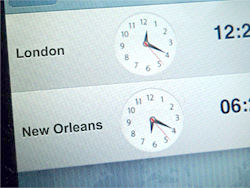2. Arranging for a taxi.
In section 1 you watched a video where Sophie Patterson is organising a taxi to the airport for a conference participant. Watch the video again and choose the correct options.
3. Arranging for a taxi.
Use the words and phrases to complete the conversation.
Watch the video again. Turn on and read the subtitles.
4. Saying times.

Note
It's possible to say the time in different ways.
7:10 = seven ten = ten past seven
7:15 = seven fifteen = a quarter past seven
7:20 = seven twenty = twenty past seven
7:30 = seven thirty = half past seven
7:45 = seven forty-five = a quarter to eight
7:50 = seven fifty = ten to eight
Choose the correct way to say each time.
Now listen to the times.
6. Because, so that and in case.
Look at the examples.
I have to leave now because my flight is at 7:30.
because + a reason
Allow 45 minutes in case there's a lot of traffic.
a precaution + in case + a possible necessity or problem
I'll leave early so that I have more time.
a precaution or action + so that + a purpose: a desirable result / to make something happen
Choose the correct option to complete the sentences.
7. Talking about schedules.
Look at the conference schedule and mark the sentences true or false.
SCHEDULE
Morning sessions
8:30 – 9:00 breakfast 9:15 – 10:15 10:30 – 11:30 break 12:00 – 1:30
Lunch
1:30 – 3:00
Afternoon sessions
3:15 – 4:15 break 4:40 – 5:40
8. Talking about schedules.
Question tags
Question tags are often used in spoken English. They are added on to a sentence to change it into a question.
For example:
The auxiliary verb in the question tag depends on the verb in the sentence.The first session is at eight o'clock, isn't it?
The first session starts at eight o'clock, doesn't it?
You phoned for a taxi, didn't you?
Look at the schedule again. Choose the correct response to the questions.
SCHEDULE
Morning sessions
8:30 – 9:00 breakfast 9:15 – 10:15 10:30 – 11:30 break 12:00 – 1:30
Lunch
1:30 – 3:00
Afternoon sessions
3:15 – 4:15 break 4:40 – 5:40
9. Talking about schedules.
Can you remember? Type in the missing words. (Clue: You can double-click in a box to see the first letter of a missing word.)
10. Speaking Tutorial 3.
Send your tutor an email suggesting a day and time for the speaking tutorial.
During the tutorial you will do a role play. Your tutor is a conference participant and you are a conference organiser. A conference participant (your tutor) phones you to ask for information about the schedule and to organise getting to the airport in the afternoon. During the phone call you will:
- explain the schedule to the participant
- suggest how to get to the airport
- offer to phone for a taxi
- negotiate a time for the taxi to come
Refer to the schedule and try to use the phrases below.
SCHEDULE
Morning sessions
8:30 – 9:00 breakfast 9:15 – 10:15 10:30 – 11:30 break 12:00 – 1:30
Lunch
1:30 – 3:00
Afternoon sessions
3:15 – 4:15 break 4:40 – 5:40
Useful language
Yes, I'll certainly try.
Certainly. I suggest you …
Yes, no trouble at all. I'll do it now.
I'm afraid not. You'll have to …
I'll phone to …
Yes, of course.
Yes, that's right.
in case / so that / because
Useful phrases for the speaking tutorial:
Hello, this is ....
Can I speak to ..., please?
Hello ..., this is .... I'm calling to do Speaking Tutorial 3 of the Dealing with the Public module.
